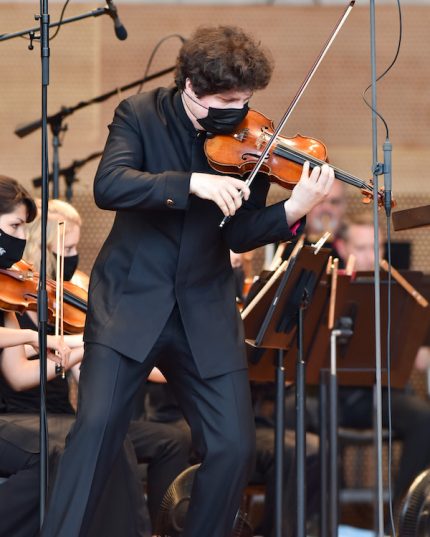A Northern night at Grant Park Festival with Tchaikovsky and Sibelius

On a humid but mercifully dry night on Chicago’s lakefront, the Grant Park Music Festival offered a cooling Notably Northern program of Russian and Finnish music Friday at the Pritzker Pavilion.
Masking for non-wind Grant Park Orchestra musicians, soloists and conductors continues as it has all summer—making every festival concert resemble a convention of thoracic surgeons.
“How many symphonies did Tchaikovsky write?” asked the music professor. “Three,” replies a smarty student. “The Fourth, the Fifth and the Sixth.”
An old joke but one that has some truth to it. The long-neglected first three symphonies may lack the dramatic weight and thematic unity of the later works, but are just as rich in melody and have much to offer in the right hands. That was made abundantly clear with the resplendent performance of Tchaikovsky’s Symphony No. 1 “Winter Dreams” led by Carlos Kalmar Friday night.
The First Symphony is chockablock with luxuriant themes and brilliant orchestral writing. Kalmar clearly believes in this music as evidenced by the concentrated attention and care he brought to the opening movement (“Dreams of a Winter Journey”). Any thoughts of inconsequentiality were blown away by the forceful drama Kalmar and the players invested in the main theme, the conductor whipping up the development to a cataclysmic climax. Yet that intensity was nicely balanced by the yielding tenderness of the lilting secondary theme.
The ensuing slow movement (“Land of Gloom, Land of Mists”) was aptly atmospheric, enhanced by Anne Bach’s expressive oboe solo. The Scherzo—long a staple of classical radio—lacked the last dollop of charm but also benefited from the colorful Grant Park woodwinds. Kalmar and the Grant Park strings imbued the waltz-like trio section with a balletic warmth that seemed to point the path forward to the composer’s Swan Lake and Nutcracker.
In the finale, Kalmar patiently paced the brooding introduction so the first appearance of the brilliant main theme made its full, eruptive impact. From whirling strings and majestic brass, the Grant Park players were at their best across all sections, as Kalmar led a fiery and exhilarating race to the rousing coda.
The evening led off with Augustin Hadelich as soloist in the Violin Concerto of Jean Sibelius.
The melodies in the Finnish composer’s sole concerto are often lush and Romantic but the music at its essence is centered on a cool Northern style—austere, tough and elemental, with a restless, mercurial quality in both the violin writing and that of the orchestra.
Hadelich played with a glowing yet focused, tensile tone, evenly produced and technically immaculate throughout.
His was a spacious, fantasia-like conception of this work. The violinist leaned into legato passages, often drawing out solo phrases lovingly—perhaps too much so at times, sacrificing some dramatic bite and forward momentum. That may have led to the fitful lack of synchronicity with the orchestra, with Kalmar’s accompaniment feeling like it got the short end of rehearsal time.
But this was largely a compelling account that improved with each movement and Hadelich was at his finest in the finale. Against the galumphing, ominously insistent main theme, the soloist ratcheted up the speed and intensity of his solo fireworks until the emphatic coda.
Encores have been rarities this summer in the Grant Park Music Festival’s post-Covid season of shortened programs. But the repeated ovations and applause brought Hadelich back out for a bonus—Coleridge-Taylor Perkinson’s Louisiana Blues Strut. The German-American violinist threw off this saucy fiddle cakewalk with down-home idiomatic swing, country blues swagger and huge panache.
The program will be repeated 6:30 p.m. Saturday. gpmf.org
Posted in Performances


Posted Aug 08, 2021 at 7:22 am by Susan Frazier
We are privileged to be able to hear (and see) Augustin Hadelich at Grant Park. He is probably at the top of the current violinists in the world today. His performances are always thrilling to witness.
Bravo Augustin!